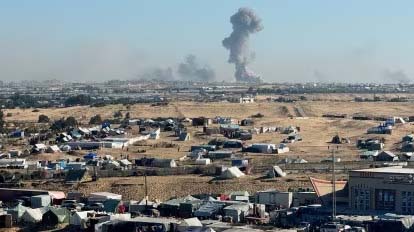In the predawn hours of Monday, Rafah in the southern expanse of the Gaza Strip experienced a barrage of Israeli airstrikes. This urban refuge, housing 1.4 million Palestinians seeking sanctuary from the prolonged Israel-Hamas conflict, found itself under renewed threat.
Signs from Israel suggest an impending ground incursion targeting this densely inhabited city along the Egyptian border. President Joe Biden, in a robust message to Prime Minister Benjamin Netanyahu on Sunday, emphasized the imperative of a well-founded and executable strategy for any military operation in Rafah, cautioning against jeopardizing civilian safety.
The strikes pinpointed the vicinity of Kuwait Hospital on Monday morning, as reported by an Associated Press correspondent in Rafah. The aftermath saw casualties transported to the hospital, though specifics regarding damage or injuries from these strikes remain undisclosed, according to the Israeli military.
While the details of the targeted “terror targets in the area of Shaboura” in Rafah are not elaborated upon, Palestinian health officials have yet to provide casualty information.
President Biden’s discourse marks a heightened stance on the prospective operation, expressing concern over Israel’s military response in Gaza the previous week and calling for urgent measures to enhance humanitarian aid. The conversation between Biden and Netanyahu, lasting 45 minutes as reported by Israel’s Channel 13 television, predominantly centered on the potential for a ceasefire agreement. An anonymous U.S. administration official disclosed that a “framework” for a deal, involving the release of hostages held by Hamas in exchange for halting hostilities, is now “pretty much” in place.
Notably, Egypt, a key mediator alongside the United States and Qatar, issued a warning during the call. The country threatened to suspend the longstanding peace treaty with Israel if an incursion into Rafah occurred. Such an intervention could force Palestinians into the Sinai Peninsula, disrupting Gaza’s primary aid supply route.
The stakes were raised as Netanyahu asserted the necessity of sending troops into Rafah to secure victory in the four-month conflict against Hamas. Allegedly, four battalions of Hamas are stationed in the city.
The potential suspension of the Camp David Accords, integral to regional stability for almost half a century, looms large, adding complexity to an already intricate diplomatic landscape. The EU’s foreign policy chief, Josep Borrell, warned of an “unspeakable humanitarian catastrophe” and deemed forced displacement a war crime.
As the standoff persists between Israel and Egypt, both close U.S. allies, concerns mount over the impact on the dire humanitarian situation in Gaza. Approximately 80% of residents have fled their homes, and a quarter of the population faces the looming threat of starvation.
A ground operation in Rafah could sever a vital route for delivering essential supplies, exacerbating the already catastrophic conditions. While aid groups express apprehension, Israel’s commitment to directing evacuees north of Rafah faces logistical challenges amidst widespread destruction.
The specter of a potential humanitarian crisis looms large, with regional stability and lives hanging in the balance.




